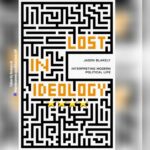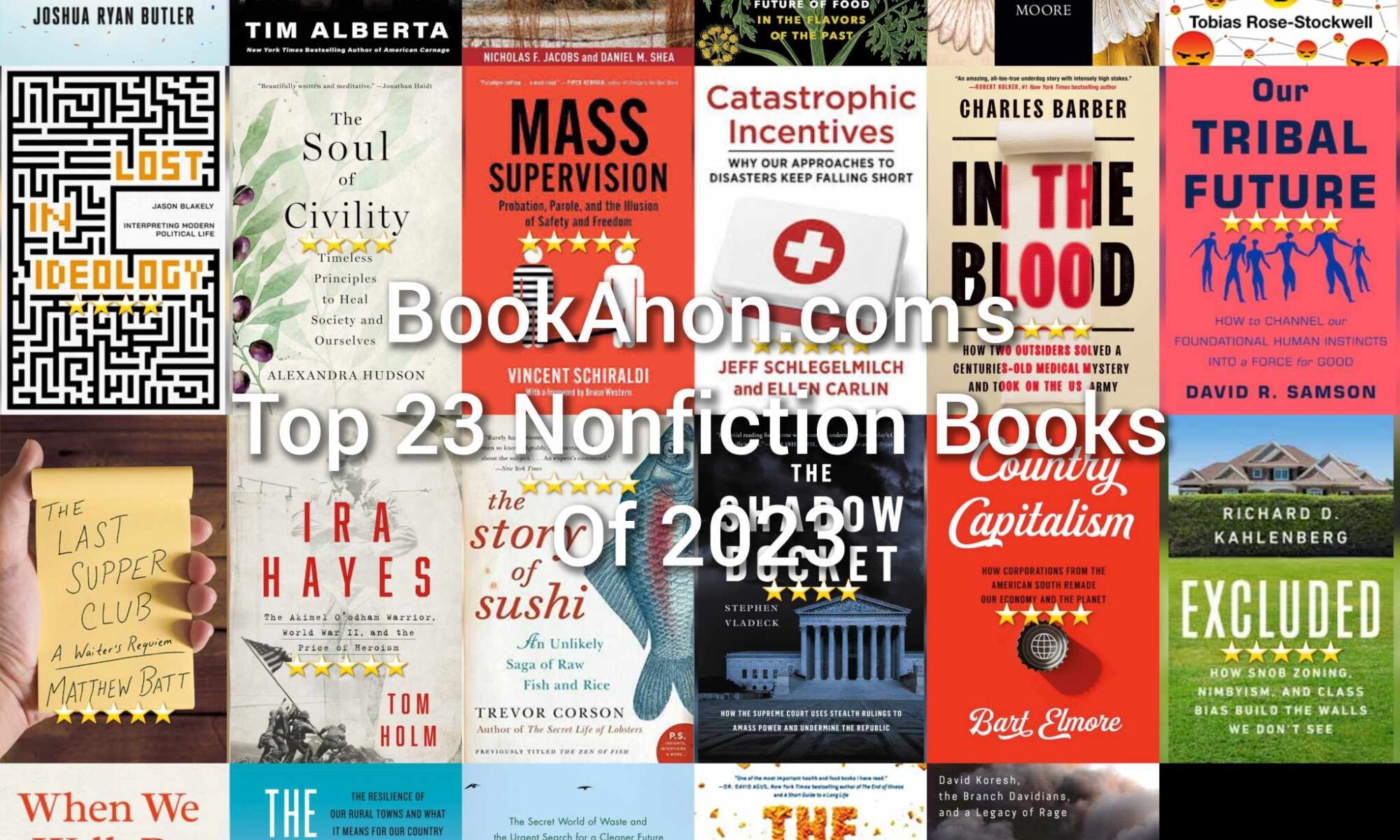I wound up reading 180 books this year, so culling those down to even 46 was a bit of a challenge. I really do encourage you to check out them all, even the ones I rated as 1* are ones that you may enjoy, should you disagree with my thoughts on the books at hand.
With that noted, here are the 23 nonfiction books that stuck out the most to me this year. Listed in the order I read them in, which *mostly* means publication order, but not *completely* – indeed, at least one of the below isn’t a 2023 release and wasn’t an ARC! (SHOCK!!!)
 Waco by Jeff Guinn
Waco by Jeff Guinn
From my review on BookHype.com:
And then we get a near second by second play by play of exactly what went down and when and by whom, told from both sides and clearly showing when the evidence seems to support one side or another and when each side differs in their views and exclusive claims. This is no celebration of the man who called himself “David Koresh”, nor is it a celebration of the various police agencies and politicians and political appointees who executed the raid. Instead, it is a remarkably balanced look at just how these people came to be where they were and what happened when these two groups came to such explosive conflict. It is a remarkable look at how a clearly gifted orator could become so twisted in his own thinking – and use his gifts to twist the beliefs of so many, including some who continued in these beliefs long after the orator himself was dead. It is a remarkable look at the mistakes made by each side of the conflict and just how many points there were where history could have changed for a more peaceable outcome. It is truly a remarkable tale of the entire event seared into the American zeitgeist as simply “Waco”.
 Excluded by Rochard D. Kahlenberg
Excluded by Rochard D. Kahlenberg
From my review on BookHype.com:
this is one of the better documented texts I’ve read in quite some time, clocking in at about 37% documentation. And given its claims that some might find extraordinary – such as “In a 2014 analysis, one researcher found that the level of segregation between poor Black and affluent Black families was actually greater than that between Black families and White families” – the extraordinary documentation is needed in order to more fully prove the case, which Kahlenberg does quite well indeed here. As Kahlenberg notes early, zoning isn’t really something most Americans think about too much unless they happen to buy a piece of property (and how many of us actually do that these days??) and have some issue with the local zoning board. But zoning directly impacts the availability of housing – which is something quite a few Americans are worried about in the early part of the 2020s. Kahlenberg pulls no punches here, and shows how elites – no matter their Party or race – have been using these issues to overcome previous (and wrong and correctly outlawed) race-based barriers.
 The Dorito Effect by Mark Schatzker
The Dorito Effect by Mark Schatzker
From my review on BookHype.com:
Schatzker was also remarkably *balanced*, decrying Big Food and Big Ag for their efforts that led to blandness and loss of flavor over the last several decades while acknowledging that these same efforts are what has enabled humanity to continue to feed itself – and applauding these same groups’ efforts to re-introduce flavor while maintaining as much modern yields as possible. Even here though, he does note – and *arguably* seem to take a touch of glee in – the idea that flavorful, more nutritious foods will always be a few multiples more expensive than more bland, less nutritious foods. Which yes, does allow at least a potential perception of classism, though I note here that I never really felt he was being classist so much as simply a gourmand passionate about truly great food. Indeed, the final pair of chapters, structured around his efforts at a “perfect meal” of sorts, brought the entire narrative together quite well while also being quite visceral in its love of both that meal and telling the tale of it.
 Country Capitalism by Bart Elmore
Country Capitalism by Bart Elmore
From my review on BookHype.com:
Ultimately this truly is a seemingly solid history, if from a leftist perspective, and actually exposes something I suspect I’ve *known* of for a while without realizing the full extent of the problem – a problem Elmore exposes here while proclaiming it to be a great and beneficial thing – and that is the problem of lobbying not in Legislative Halls but in Corporate Boardrooms. Of lobbying interests attacking not elected legislators, but CEOS and others in power of corporations that, thanks to the corporatism described in this text, have power that in many ways rivals – and arguably even exceeds – that of elected officials.
 Our Tribal Future by David R. Samson
Our Tribal Future by David R. Samson
From my review on BookHype.com:
Here, Samson discusses the history, biology, and sociology of our “Tribe Drive” – ongoing and apparently bleeding edge research in all three fields – and shows how it has brought us to where we are… and how we can better utilize it to achieve a more peaceable and prosperous future for all.
 Wasteland by Oliver Franklin-Wallis
Wasteland by Oliver Franklin-Wallis
From my review on BookHype.com:
But what Franklin-Wallis *does* cover, he truly does cover in remarkable depth and clarity, using a combination of direct interviews and scholarly research to give both a human face to each particular issue and ground it in its full severity. This books is truly quite eye opening in several different respects, and will likely greatly add to the overall discussion of the topic… assuming enough people read it. Which is, in part, where this review comes in. Go read the book already. 🙂
 The Shadow Docket by Stephen Vladeck
The Shadow Docket by Stephen Vladeck
From my review on BookHype.com:
there isn’t a political “side” in current America or American history that is fully blameless in enabling or using this bad behavior, and Vladeck shows this quite well indeed and indeed seems to be a fairly objective-ish student and teacher of legal history. For such a dense overall topic, Vladeck handles the telling of the tale quite well, such that even people who have barely ever heard of the Supreme Court of the United States of America will be able to clearly see what the current problem is and how we got to this point and why both of them matter.
 In The Blood by Charles Barber
In The Blood by Charles Barber
From my review on BookHype.com:
Barber, through a seemingly episodic format where he provides brief biographical sketches of each of the key players in the unfolding drama while keeping the narrative squarely focused on Hursey, Gullong, and their products, tells a story at least as motivational as anything has ever been told about Turing’s own life. A story of a almost literal garage inventor who finds and develops a substance that has literal world changing powers. A substance that can make battlefield – or anywhere else – traumas far more survivable, by finally solving a problem humanity had never before solved in its known history – how to stop mass bleeding. This is the story of how Hursey and Gullong found, developed, and marketed the substance to the US military – and then later found mass market appeal in nearly every segment of the economy that might find a desire to stop a potential bleed out. Including, per Barber, Taylor Swift having it near her at all times in the case of an attack at one of her concerts.
 Outrage Machine by Tobias Rose-Stockwell
Outrage Machine by Tobias Rose-Stockwell
From my review on BookHype.com:
while the overall premise about the titular Outrage Machine seems sound and the explanations directly on it seem fairly spot-on, Rose-Stockwell uses the sciences, history, and even semi-current events in a way that actually brings to mind the practice rampant in the Christian nonfiction space known as “prooftexting”, wherein Bible verses are cited outside of their context, and often even contrary to their original context, in “proof” of some point or another. Here, Rose-Stockwell does this with the sciences and history, both near and far. Yes, many of the examples he cites seem at least somewhat relevant, but even in the most relevant of them (such as his discussion of COVID), he ignores and even denigrates needed context which deviates from his intention.
 The Overlooked Americans by Elizabeth Currid-Halkett
The Overlooked Americans by Elizabeth Currid-Halkett
From my review on BookHype.com:
Wokeism (n): The Tendency Towards Social Justice Turned Toxic. Got your attention with the headline here, right? Good. Now sit down in that chair right there and let me show you how “it’s done”. When you get beyond David Auerbach’s Meganets, when you get beyond Tobias Rose-Stockwell’s Outrage Machine, when you get to the *person* you think you so adamantly oppose… … what happens when you find out that while they may come from a different culture than you, the human condition remains the same across cultures, and ultimately they share quite a bit of commonality with you? What happens when you find out the monster at your door, the horrid kaiju that is threatening your children and your very way of life… … is just another person who is just trying to protect his own way of life and his own kids, who thinks that *you* are the horrid kaiju threatening *his* kids and way of life? What happens when you stop shooting at each other for just one minute… … and find out that you had far more in common than you ever had different all along?
 The Story Of Sushi by Trevor Corson
The Story Of Sushi by Trevor Corson
From my review on BookHype.com:
This was an interesting approach to the topic of sushi where rather than just look to how sushi is prepared at the time of the writing of this book (18 yrs ago as I write this review) or just the science and history of the various elements of sushi, Corson instead used the case study of a particular group of students learning how to make sushi at a particular school at a particular point to then springboard from there into the history and the science. He does both quite artfully, though the contemporary scenes he describes feel a touch dated nearly twenty years later, as Corson describes sushi in both Japan and America as on the cusp of either greatness or collapse here.
 Catastrophic Incentives by Jeff Schlegemilch and Ellen Carlin
Catastrophic Incentives by Jeff Schlegemilch and Ellen Carlin
From my review on BookHype.com:
Overall a solid and informative look at a lot of aspects of disaster response – and particularly disaster response coordination – that most even within the field probably aren’t fully aware of, and for this alone it is absolutely essential reading for anyone who may ever experience a disaster. Which is everyone, everywhere.
 Losing Our Religion by Russell Moore
Losing Our Religion by Russell Moore
From my review on BookHype.com:
Welcome Back, Dr. Moore! For roughly a decade now, the once-phenomenal Dr. Russell Moore has been either a shill for SBC Leadership in his role as head of its Ethics and Religious Liberty Commission or embroiled in controversy over his rabid anti-Trumpism. Here, while not *completely* stepping back from either position, Moore does an excellent job of calling American Churchianity – not just the SBC, but *all* of American Churchianity – back to a focus on Christ, Him Crucified, and Spreading the Gospel. Full of Southern aphorisms that even this native Son of the South rarely heard in the exurbs of Atlanta, despite being barely a decade younger than Moore, this text also shows just how knowledgeable and insightful Moore at his best can show himself to be. And yes, while allowing that he is still wrong on a few positions (which I’m sure he and others would disagree with me over), this really is a return to the best of Moore, the Moore that made me at first *excited* that he was taking over the ERLC.
 When We Walk By by Kevin F. Adler and Donald W. Burnes
When We Walk By by Kevin F. Adler and Donald W. Burnes
From my review on BookHype.com:
At the end of the day, there are very clear differences in how the authors here and I approach this (and likely many) issue, and I suspect that will be true of many who read this book as well. But if you’re interested in the issue of homelessness at all, if you’re truly interested in trying to help end this problem, if you’re searching for something you can personally do to help, if you’re looking for ideas to work at any level to assist… you should read this book. It really is quite a solid primer, despite the authors’ clear bents, and at minimum it will help you avoid pitfalls that are far too common even among those with quite a bit of experience working within these communities.
 Ira Hayes by Tom Holm
Ira Hayes by Tom Holm
From my review on BookHype.com:
Holm does a remarkable job of showing the history that created Ira Hayes, one of the six men immortalized forever in “The Photograph” of the American flag raising at Mt. Suribachi on Iwo Jima during the WWII battle which became the basis of so many memorials… including a not-small one in Washington, DC. As with the better history books, Holm shows the relevant histories that lead into the famous events at hand- and the biography and histories of the fallout of the events, including the various impacts to both the man Ira Hayes and the cultural icon/ touchstone Ira Hayes. Yes, including the various movies, the various incarnations of The Ballad of Ira Hayes (including the Man in Black’s), and even discussing the book The Flags of Our Fathers and its movie incarnation as well. At 22% documentation, it is reasonably well documented, and there are no overly startling revelations here – though there is perhaps much new knowledge, depending on one’s own knowledge set when coming into this book. For example, the histories of the Akimel and Apache wars and interactions, and even how they waged war (both the weapons involved and the tactics and ceremonies) was new knowledge to me – and utterly fascinating.
 Mass Supervision by Vincent Schiraldi
Mass Supervision by Vincent Schiraldi
From my review on BookHype.com:
He is also clearly a New York Liberal Elite… and this flavors his overall discussion quite heavily. Still, that is a more “your mileage may vary” level, and like with the more libertarian bent of Rise of the Warrior Cop… you need to read this book anyway, no matter your politics, if you truly want to be informed of the scope of the actual problem here. Yes, the “solutions” tend to essentially be “take money from prisons/ courts and give it to these other areas” or even simply “give more money to these other areas”, as one would expect from a New York Liberal Elite, but there are also quite a few realistic and useful approaches, such as Schiraldi’s discussion of having his offices switch from in person check-ins to computerized check-ins that both saved money and allowed a greater opportunity for those under his supervision to comply with the relevant controls.
 The Lost Supper by Taras Grescoe
The Lost Supper by Taras Grescoe
From my review on BookHype.com:
this is a truly great book that foodies in particular will absolutely love. Given the literal hundreds of different shows about food and culinary pursuits, including several actively traveling around the world highlighting various dishes and techniques just as this book does… clearly there is a market for exactly this kind of tale, and this one does in fact appear to work perfectly within that market.
 The Last Supper Club by Matthew Batt
The Last Supper Club by Matthew Batt
From my review on BookHype.com:
This is a memoir of one of those moments in one man’s life where he was just looking to make a buck and make sure his family was ok… that turned into something he found he loved doing. After it ended, this book has become his love song to that period in his life, that place, and those people. And yes, Batt discusses his entire life, including touching on what he is doing outside the restaurant quite a bit. But even when the tale leaves the restaurant, it never strays too far… and it always comes back fairly quickly. Overall a poignant tale that will leave you looking back on the similar periods of your own life.
 The Soul Of Civility by Alexandra Hudson
The Soul Of Civility by Alexandra Hudson
From my review on BookHype.com:
This truly is an exceptional, bordering on transcendental, examination of the history and nature of civility, with plenty of real-world applications that are sorely needed – and truly challenging for even the most committed of us. This is one of those books that is going to challenge you to be better in ways that few outside the overtly religious texts manage to do, and it is one that is largely going to leave you with a smile even as it calls you out.
 The Rural Voter by Nicholas F. Jacobs and Daniel M. Shea
The Rural Voter by Nicholas F. Jacobs and Daniel M. Shea
From my review on BookHype.com:
Now, as to the actual text at hand for this review: It really was quite remarkable. Don’t let the three star rating fool you: this is a book that you *need* to read if you hope to have any remotely accurate understanding of politics in the United States, as it is the singular best book I’ve found to date on just what makes its titular subject a truly distinct class. In likely north of 90% of the time, I can tell you straight up that no matter what you *think* the rural voter is or how you *think* they vote or what you *think* they value… you’re more than likely wrong. Read this book to set your facts straight, and proceed from there as you will.
 Lost In Ideology by Jason Blakely
Lost In Ideology by Jason Blakely
From my review on BookHype.com:
Showing the history and development of each “map”, as Blakely calls them, (but without much documentation – more on that momentarily), Blakely does a remarkably balanced job of showing each school of thought in as close to a neutral fashion as may be possible – extremists within any given school may think he didn’t present “their” side good enough, or perhaps shows “their” enemies in too good of a light, but from an objective-ish position, I stand by my statement of just how neutral he really is here. And yes, I really do think this should be required reading for every US voter before really even deciding who ultimately to vote for in any given election, as this book is truly a solid primer on the various ideologies used throughout the US and their various offshoots and intersections. Truly, it will allow each individual to better understand even those they disagree vehemently with, and ultimately a voter that better understands everyone is a better informed voter, period, who ultimately would at least have the ability to make a more fully informed decision.
 The Kingdom, The Power, and The Glory by Tim Alberta
The Kingdom, The Power, and The Glory by Tim Alberta
From my review on BookHype.com:
Structured in the wake of Alberta’s father’s death – a prominent megachurch pastor in Michigan – and some rather nasty political comments some Alberta had known for many years made to him in those darkest of moments, this book travels the United States – and even goes briefly abroad – examining the ways American Evangelicals have allowed the lure of politics to sway them, how some are fighting back, and what others are doing in response. It is a darkly hopeful tale of somehow, someway, potentially maybe clawing back to some semblance of historical Christianity that the American Church has long lost, and the overall narrative here is actually rather solid.
 The Party Crasher by Joshua Ryan Butler
The Party Crasher by Joshua Ryan Butler
From my review on BookHype.com:
Overall though, this is yet another of those books that, particularly going into a Presidential election year with all of the hand-wringing, arguments, and outright vitriol that includes in the modern era of American politics (and every era, according to other works I reviewed a few years ago such as James Morone’s Republic Of Wrath), every single member of every single American Church – no matter the individual’s politics or the church’s faith traditions – *needs* to read. Short at just 220 or so pages – over 22% of that being bibliography and discussion questions – this is written in a fairly conversational style such that one could easily envision Butler speaking this entire book into existence over the course of probably a couple of months or so of sermons. The included discussion questions, both at the end of each chapter and at the end of the book, foster a great deal of introspection and, in the case of groups, discussion, and could genuinely go quite a way to at least moderating the vitriol of this and hopefully future campaigns.
























